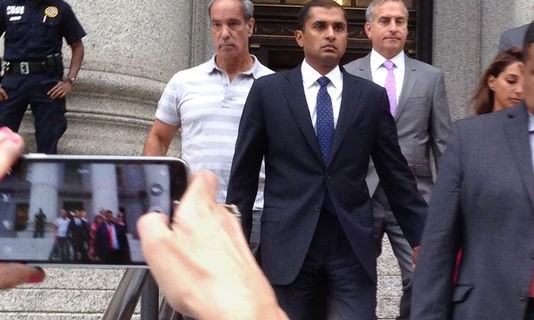Ex-SAC Capital trader gets 9-year sentence

Former SAC Capital portfolio manager Mathew Martoma was sentenced to a nine-year prison term Monday for his role in what federal prosecutors called the most profitable insider-trading scheme in U.S. history.
Martoma, a former financial lieutenant to billionaire hedge fund founder Steven Cohen, sat silently, declining to speak before U.S. District Judge Paul Gardephe imposed the sentence in Manhattan federal court.
The judge also ordered the 40-year-old father of three to forfeit nearly $9.4 million — more than his current net worth — and surrender for imprisonment on Nov. 10. His attorneys plan to appeal his Feb. 6 conviction.
Gardephe said the evidence showed Martoma went for “one big score” that would provide lifetime security. “His plan worked, but now he has to deal with the fallout,” the judge said before imposing a sentence in the higher range of other recent insider-trading cases.
“Mathew Martoma and his family are devastated by the outcome. They would like to thank everyone who has supported him throughout this process,” defense lawyers said in a statement after the sentencing.
Federal jurors found Martoma guilty of conspiracy and two counts of securities fraud after a month-long trial during which declined to testify. The case centered on charges that he illegally obtained disappointing results of clinical tests on an experimental Alzheimer’s disease drug in 2008 by cultivating relationships with two doctors who were privy to details of the testing outcome.
Martoma then set in motion a $700 million sell-off of SAC Capital stock holdings in shares of Elan and Wyeth, the pharmaceutical firms that developed the drug. The transactions generated approximately $276 million in profits and avoided losses, along with a nearly $9.4 million 2008 bonus for Martoma.
The sentence imposed by Gardephe was lower than the 188-month- to 235-month-range specified in federal sentencing guidelines. It exceeded the eight-year prison term recommended by probation officials and met prosecutors’ request for a sentence higher than that recommendation.
The sentence came after defense attorney Richard Strassberg argued for leniency. He urged Gardephe to weigh Martoma’s devotion to his family and history of helping others. The defense lawyer also filed more than 100 support letters from Martoma’s relatives and friends — some of whom were in the courtroom for the sentencing.
The defense team argued that Martoma was the sole source of financial support for his wife, Rosemary, and the couple’s three young children. “Mathew, as a person, is much more than the charge of insider-trading that has brought us all to this courtroom today,” said Strassberg, who contended that a “just” sentence would consider Martoma’s history of charitable acts and helping others.
But federal prosecutor Arlo Devlin-Brown said: “It is hard to think of a more significant and brazen instance of insider trading than the case before this court. The sentence in this case, we submit, must reflect the seriousness of this significant breach.”
Gardephe said he had weighed all of the legal submissions from both sides and studied sentences in other insider-trading convictions before issuing his ruling. He credited Martoma’s charity and other acts of generosity and considered the impact a prison term would have on the defendant’s family, but said he could not ignore the facts of the case and the sentencing guidelines.
“Here, there was nothing accidental about Mr. Martoma’s conduct and the gain that was realized,” said Gardephe. Evidence that showed Martoma’s two-year cultivation of a relationship with Dr. Sidney Gilman, the researcher who chaired a key panel in the drug trial, showed the insider trading had been carefully planned, the judge said.
Gardephe also referred to Martoma’s 1999 expulsion from Harvard Law School for falsifying a grades transcript used to seek federal judge clerkships, as well as his subsequent admission to Stanford University’s business school without disclosing the episode.
“I do believe there is a connection,” said Gardephe, citing what he called a “darker side” to Martoma’s character. “The common thread is an unwillingness to accept anything but the top grade … and the highest bonus.”
At least one Martoma supporter called the nine-year sentence unjust after the hearing. But Manhattan U.S. Attorney Preet Bharara said “the long and short of Mathew Martoma’s trading is that he traded his liberty, his name and his time with his family for what in the end is nothing.”
Cohen, who has denied any wrongdoing and never been criminally charged, was an unseen presence during the case. But trial evidence showed that he and Martoma participated in a 20-minute phone call before the massive stock sell-off.
Nonetheless, the insider-trading convictions of Martoma and another former SAC Capital portfolio manager pushed the hedge fund to plead guilty to criminal charges of securities fraud and wire fraud in a $1.8 billion settlement with prosecutors last November. The deal, finalized in April, required Cohen’s long-envied financial operation to permanently cease handling investments for outsiders. It has since morphed into a so-called family office managing Cohen’s private fortune.
Cohen still faces a civil administrative proceeding in which the Securities and Exchange Commission has accused him of failing to properly supervise hedge fund employees who became involved in insider trading.
Source: Usatoday





























